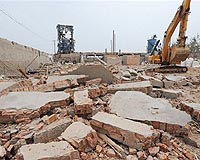| . |  |
. |
Dhaka (AFP) Aug 23, 2010 Bangladesh's Supreme Court has reimposed strict environmental controls on the country's ship-breaking yards, a lawyer said Monday, in a verdict likely to trigger protests from the sector. Companies warned that the decision could be disastrous for the country's ship-breaking industry, the world's largest. All ships scrapped must now be certified toxic-free by the selling nation's environmental authorities, the court said, reinstating a January law the government was forced to abandon in April after lengthy strikes by shipyards. "It is a victory of humanity over raw money and muscle power," lawyer Rizwana Hasan, who heads the Bangladesh Environmental Lawyers Association, the group that brought the case to the Supreme Court, told AFP. "After this ruling from the country's highest court there can be no more flip-flops in government policy on enforcement of environmental standards in the ship-breaking industry," she added. The Supreme Court said the industry would be allowed to appeal the ruling, but not for four months. The verdict is a major blow for Bangladesh's ship-breaking industry -- the world's largest -- which successfully lobbied in April for the right to import ships on their own declarations that the vessels are free from toxic materials. "This latest court order could bring an end to the ship-breaking industry in Bangladesh. Thousands of workers will lose their jobs," said Anam Chowdhury, an advisor to the Bangladesh Ship Breakers Association. "It's a victory for environmental groups. They want Bangladesh -- a third-world country -- to maintain European standards. Even India, our main competitor in the ship-breaking industry, does not have such standards," he said. Dismantling old ships is a key industry in the South Asian nation, providing more than two-thirds of domestic steel. Iron prices shot up 20 percent earlier this year when breaking yards shut to protest against the law. The country's some 100 breaking yards imported nearly 200 ships last year -- about 30 percent of all ships recycled globally, according to London-based Clarkson Research. Environmental groups say labour safety and environmental standards are routinely ignored in the scrap yards, leading to the deaths of at least 300 workers in the past decade and massive pollution along the south-eastern coastline. Ships heading for Bangladesh routinely contain chemicals such as asbestos, which is banned in many countries, but the government has struggled to force the powerful industry to improve standards.
Share This Article With Planet Earth
Related Links Our Polluted World and Cleaning It Up
 China closes factories as green deadline looms
China closes factories as green deadline loomsBeijing (AFP) Aug 22, 2010 China, facing the risk of embarrassment if it misses a looming environmental deadline, has ordered thousands of companies to close high-polluting plants as its leadership vies to retool economic growth. Beijing has pledged to slash China's energy consumption per unit of gross domestic product by 20 percent between 2006 and 2010, as the world's biggest greenhouse gas emitter seeks to reduce p ... read more |
|
| The content herein, unless otherwise known to be public domain, are Copyright 1995-2010 - SpaceDaily. AFP and UPI Wire Stories are copyright Agence France-Presse and United Press International. ESA Portal Reports are copyright European Space Agency. All NASA sourced material is public domain. Additional copyrights may apply in whole or part to other bona fide parties. Advertising does not imply endorsement,agreement or approval of any opinions, statements or information provided by SpaceDaily on any Web page published or hosted by SpaceDaily. Privacy Statement |